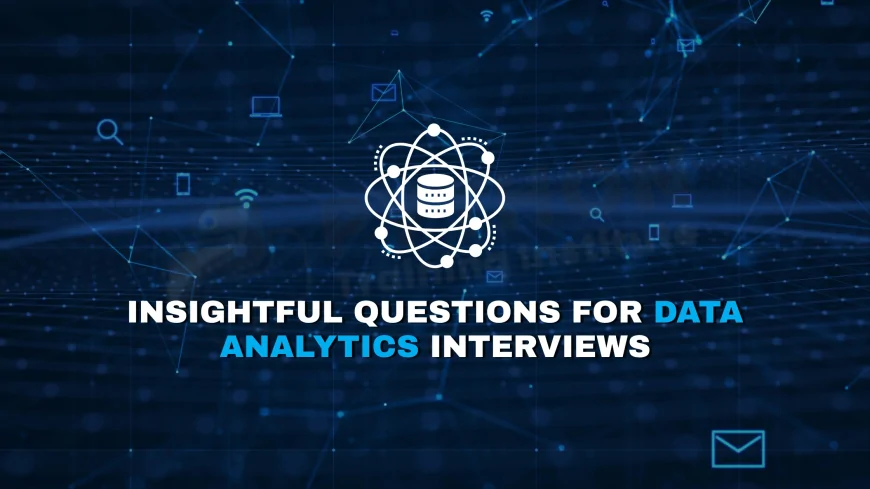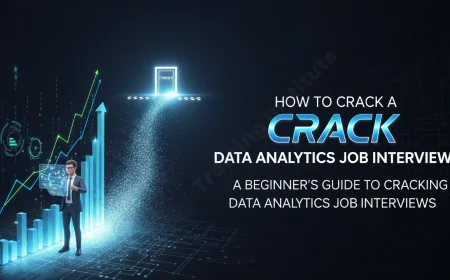Best Questions to Ask in a Data Analytics Job Interview | Best Candidate Questions for a Data Analyst Interview
Discover the best questions to ask during a data analytics job interview. Impress hiring managers, evaluate company fit, and show you're ready for success.

Table of Contents
- Introduction
- 1. Why Asking Questions in an Interview Matters
- 2. The Mindset Behind Good Questions
- 3. Categories of Questions to Ask
- 4. Company-Specific Questions
- 5. Role-Specific Questions
- 6. Team and Collaboration Questions
- 7. Tools, Technology, and Infrastructure
- 8. Data Quality and Availability Questions
- 9. Questions on Projects and Challenges
- 10. KPIs and Success Metrics
- 11. Questions on Learning and Growth Opportunities
- 12. Questions to Ask the Interviewer About Their Journey
- 13. Questions That Reveal Red Flags
- 14. Work Environment and Flexibility
- 15. Company Culture and Decision-Making
- 16. Common Mistakes When Asking Questions
- 17. Questions to Avoid in a Data Analytics Interview
- 18. Tips for Preparing Your Own Questions
- 19. When and How to Ask Questions in the Interview
- 20. Bonus: 10 Smart Questions to Impress Any Data Hiring Manager
- FAQs
- Conclusion
Introduction
Most job seekers spend all their time preparing answers for an interview—but forget that interviews are two-way conversations. Asking thoughtful questions not only demonstrates your interest in the role but also helps you evaluate whether the position aligns with your skills, goals, and values. In the data analytics domain, asking the right questions is crucial due to the technical, strategic, and cross-functional nature of the work.
1. Why Asking Questions in an Interview Matters
Asking intelligent questions:
- Shows curiosity and engagement
- Highlights your strategic thinking
- Reveals your domain knowledge
- Helps you determine if the job is right for you
2. The Mindset Behind Good Questions
Think of yourself as a consultant evaluating a partnership. Good questions should:
- Be open-ended
- Focus on value creation
- Seek clarity on expectations and challenges
3. Categories of Questions to Ask
Questions typically fall into these buckets:
- Company-related
- Role and expectations
- Team dynamics
- Technology and tools
- Data processes
- Career growth
- Culture and work environment
4. Company-Specific Questions
- How does the company currently use data in its strategic decision-making?
- What are the major data initiatives planned for the next year?
5. Role-Specific Questions
- What would a typical day look like for someone in this role?
- What key challenges should I be prepared to handle in the first 3 months?
6. Team and Collaboration Questions
- How is the analytics team structured?
- Who are the main stakeholders I’ll work with?
7. Tools, Technology, and Infrastructure
- Which tools and technologies are used most frequently by the team?
- Is there flexibility to introduce or suggest new analytics tools?
8. Data Quality and Availability Questions
- What’s the current state of data infrastructure?
- Are there any known issues with data accuracy or accessibility?
9. Questions on Projects and Challenges
- Can you describe a recent analytics project and its impact?
- What are the top 3 business problems the analytics team is solving?
10. KPIs and Success Metrics
- How is success measured for this role?
- Are there specific KPIs or performance indicators I would be responsible for?
11. Questions on Learning and Growth Opportunities
- Does the company support certifications or continued learning in analytics?
- What does a typical career progression look like for this role?
12. Questions to Ask the Interviewer About Their Journey
- What has your experience been like working at this company?
- What do you find most exciting about working with the analytics team?
13. Questions That Reveal Red Flags
- Why is this position open?
- Have there been frequent changes in this team recently?
14. Work Environment and Flexibility
- Is the role remote, hybrid, or on-site?
- How does the team collaborate across locations?
15. Company Culture and Decision-Making
- How are analytics insights typically received by leadership?
- Can you describe the company culture in 3 words?
16. Common Mistakes When Asking Questions
Avoid these pitfalls:
- Asking about salary too early
- Asking questions that could be answered by reading the company website
- Asking too many questions—focus on quality
17. Questions to Avoid in a Data Analytics Interview
- What does your company do?
- How many vacation days do I get?
- Will I have to work overtime?
18. Tips for Preparing Your Own Questions
- Research the company, team, and job description
- Tailor your questions to the interviewer’s background
- Keep a balance of technical and strategic questions
19. When and How to Ask Questions in the Interview
Most interviews allocate time toward the end for your questions. Keep your list ready and choose the most relevant ones based on how the interview has progressed.
20. Bonus: 10 Smart Questions to Impress Any Data Hiring Manager
- How does the company balance exploratory and operational analytics?
- How often are analytics insights turned into business actions?
- What level of autonomy do data analysts have in choosing approaches?
- What are the biggest technical challenges the team is currently facing?
- How is cross-functional collaboration between analytics and business units handled?
- How often is data literacy training conducted across departments?
- What role does storytelling play in your analytics presentations?
- Are analysts involved in product or strategy meetings?
- What’s the biggest win the analytics team had last year?
- Is there a roadmap for growing the analytics function here?
FAQs –
1. Is it okay to ask questions during a data analytics interview?
Absolutely. Asking questions shows initiative and helps you evaluate the company and role effectively.
2. What type of questions are best for a junior data analyst interview?
Focus on tools used, training support, typical projects, and team structure.
3. Can I ask about salary in the first interview?
It's better to wait until later rounds unless the interviewer brings it up.
4. How many questions should I prepare for the interview?
Prepare 5–7 strong questions and ask 2–3 based on available time.
5. Should I ask technical questions to the HR person?
No, ask HR about company culture, onboarding, and benefits. Save technical questions for hiring managers or team leads.
6. Can I ask the interviewer about their own journey?
Yes! It builds rapport and offers valuable perspective on growth in the company.
7. Is it bad to not have any questions?
Yes. It may be seen as a lack of preparation or interest. Always ask at least one thoughtful question.
8. What if my question has already been answered?
Acknowledge it and pivot to another one, or ask for more depth if it's interesting.
9. What questions reveal if the company values analytics?
Ask how data is used in strategic decision-making and if analysts have direct access to leadership.
10. Should I ask about growth and training opportunities?
Definitely. It shows you're committed to long-term learning and contribution.
11. Can I ask about remote work policies?
Yes, but preferably in later rounds unless it’s a major factor for you.
12. What’s a smart question that impresses interviewers?
“Can you share a challenge the analytics team recently overcame and how?”
13. What’s a red flag if they don’t let me ask questions?
If there’s no time or openness for your questions, it may indicate a top-down culture or lack of transparency.
14. Can asking questions help me negotiate better?
Yes. Asking about responsibilities and KPIs gives you leverage for negotiating salary or role clarity.
15. Is it okay to take notes while asking questions?
Yes, it shows professionalism. Just be discreet and avoid being distracted.
16. What if the interviewer doesn’t answer my question clearly?
Politely ask for clarification or move on. Take note—it may signal lack of transparency.
17. Can I email follow-up questions post-interview?
Yes, if they're relevant and show you’re still engaged. Keep it brief.
18. Can questions help me figure out work-life balance?
Yes. Ask about team support, overtime expectations, and project load distribution.
19. Should I rehearse my questions?
Yes, but stay natural. It’s okay to refer to a written list during the interview.
20. What’s the biggest mistake when asking interview questions?
Focusing only on benefits instead of showing value and curiosity about the role.
Conclusion
Asking the right questions during a data analytics job interview can set you apart from other candidates. It positions you as a thoughtful, strategic, and proactive professional who doesn’t just want a job—but wants the right role. Remember, interviews are a mutual discovery process. Use these questions to gain clarity, build rapport, and leave a lasting impression.
What's Your Reaction?
 Like
0
Like
0
 Dislike
0
Dislike
0
 Love
0
Love
0
 Funny
0
Funny
0
 Angry
0
Angry
0
 Sad
0
Sad
0
 Wow
0
Wow
0














